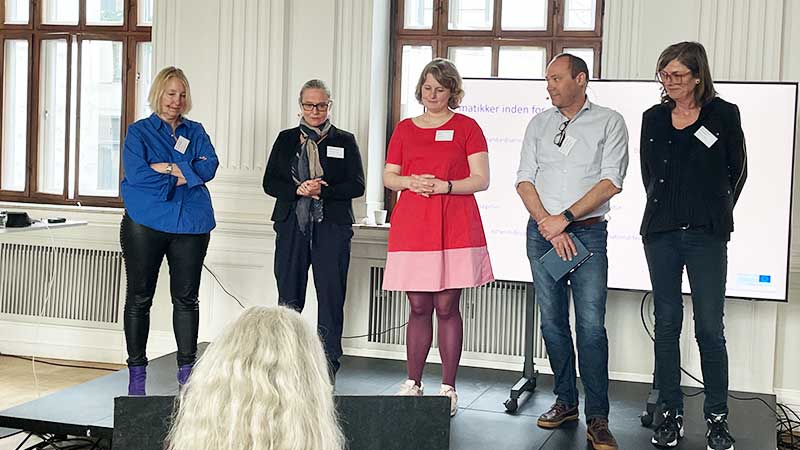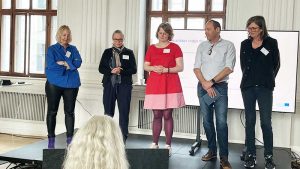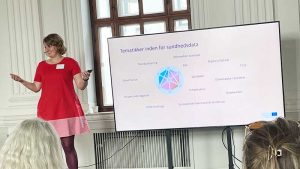New network on citizen-generated data – here are the biggest challenges on the subject

New national network for citizens’ data has been launched. The first meeting made it clear that there are many challenges associated with the use of citizen-generated data – but also many opportunities. Join the network and help make an impact on the network’s activities.
For several years, we have heard that there is huge potential for creating better health by using the data that we, citizens ourselves, create. But we lack reliable knowledge about what value our data actually can bring.
– We have a lot of hypotheses about what value our data about sleep, activity and general behaviour can add to healthcare – but we lack knowledge. Therefore, we need to work together across the public and private sectors, so that we can gather knowledge about experiences, potentials and needs from both the health sector, the private suppliers and from citizens and patients, says Frederik Mølgaard Thayssen, Principal Project Manager, Alexandra Institute.
Watch recording of first meeting in Network about citizen-generated data
New network in progress
Frederik Mølgaard Thayssen is one of the initiators of the first national network on citizen-generated data.
National network for citizen-generated data has just been launched as a collaboration between Alexandra Institute, Danish Society for Patient Safety, Data for Good Foundation, Technological Institute and Danish Life Science Cluster.

The initiative group Inge Kristensen, Trine Rolighed Thomsen, Helene Boeck, Frederik Mølgaard Thayssen and Annemette Broch.
The network is based on a definition of citizen-generated data, which is data that the citizen consciously or unconsciously collects in his/her journey, independently of the public healthcare system.
According to a new survey by Dansk Erhverv, more than every other Dane (55 percent) has used a health app that measures their physical activity within the past six months.
The challenges
At the first meeting of the network, the participants were invited to give input on topics that the network should work with. Examples of challenges:
- How can citizen data be combined with registered data, for research?
- Which trackers and wearables can deliver data of satisfying quality?
- How should citizens be able to navigate between the approx. 600,000 available health apps and numerous commercially developed tracking devices and wearables?
- What skills does it require of health professionals to include the citizens’ own collected data?
- How do we ensure equality in health for those who do not use smartphones and other trackers?
Patients are eager to use their data
Patient ambassador Tobias Bøggild-Damkvist participated in the network meeting to give the patient’s perspective on citizenship. As a diabetic and sclerosis patient, he tracks several types of data about his own health on a daily basis using, among other things, smartwatch, a glucose monitor, a finger ring that measures biometric data and various apps.
Tobias Bøggild-Damkvist is an advocate of using all the data that he and other patients want to share to improve their treatment and create knowledge for the benefit of others.
With interest he follows the process of creating a national infrastructure for Danish health data and the European Health Data Space’s work, to ensure safe sharing of health data across national borders.
– But these initiatives will only create value years into the future. As a patient, I need personalized treatment today, and I already have data that can save time and ensure faster progress of my treatment and that of others. Therefore, I hope that more healthcare professionals will find a model for how they can use my data as support for my treatment, said Tobias Bøggild-Damkvist.
An analysis shows that one in four healthcare workers has used the citizens’ own data as support in the dialogue with the patient.
Healthcare personnel need frameworks and upskilling
The health professions were also represented at the network meeting, and Doctor and Medical Lead at Roche, Andreas Pihl added a few points to the list of the challenges that must be solved before citizen-generated data can create value in the healthcare system.
– There is a need for some framework in the area. From the practitioner’s point of view, I can easily see that it can be an advantage if the patient himself brings usable data. But on the one hand, we have to make sure that the quality of the collected data is high enough, and on the other hand, there should be a framework for which systems citizens use because otherwise, it will take far too long for the processors to find their way around the amount of data, says Andreas Pihl.
According to Statistics Denmark, in 2022 there were smartphones in 93% of Danish homes – 31% of households had a GPS watch.
Networks need input from all sides
A network in the Danish Life Science Cluster is characterized by the fact that parties from both the public and private sectors are welcome and invited to take part in the planning and operation of the network.

Helene Boeck, project manager in Danish Life Science Cluster.
– We need representatives from all sectors to create a valuable network. It was therefore great to see that almost 140 participants had registered for the first network meeting across sectors and parts of the country. The initiative group is now starting to scope the topics that the network will explore based on the many good inputs we received at the meeting, says Helene Boeck, project manager in the Danish Life Science Cluster.
The national network on citizen-generated data is launched almost at the same time as the government announces that it wants to strengthen local healthcare with more treatment in one’s own home. Here, citizens’ data becomes essential for, for example, monitoring the condition of citizens and patients remotely.
Read also: New analysis: Great potential for citizen-generated data in the healthcare system
Sign up for the newsletter from the Danish Life Science Cluster and receive an invitation to meetings in the National Network for Citizen-Created Data.
Next event in the network:
My life, my data – a threat or the future of the welfare society, 15 June at 14-15.30 in the Danish Life Science Cluster’s tent (J36) at Folkemødet on Bornholm
